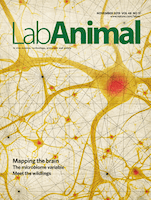
LAB ANIMAL
Scope & Guideline
Shaping the future of laboratory animal science through rigorous research.
Introduction
Aims and Scopes
- Animal Models and Translational Research:
The journal focuses on the development and application of various animal models, including mice, rats, zebrafish, and nonhuman primates, to better understand human diseases and the efficacy of treatments. - Ethical Considerations and Welfare:
It emphasizes the importance of animal welfare and ethical considerations in research, supporting the principles of the 3Rs (Replacement, Reduction, Refinement) to enhance humane practices in laboratory settings. - Innovative Techniques and Methodologies:
The journal encourages the sharing of novel experimental techniques, including gene editing, optogenetics, and advanced imaging methods, aimed at improving experimental outcomes and data reproducibility. - Cross-Species Insights:
Research that draws comparative insights across different species, including studies on genetic, physiological, and behavioral aspects, is a key component of the journal, enhancing the understanding of biological processes. - Environmental and Housing Impact:
The journal addresses how various environmental factors and housing conditions affect animal behavior and research outcomes, advocating for improvements in laboratory conditions.
Trending and Emerging
- Gene Editing and CRISPR Technologies:
There is a significant increase in research utilizing gene editing technologies, particularly CRISPR, to create novel animal models for studying genetic diseases and therapeutic interventions. - Microbiome Research:
Studies focusing on the microbiome's role in health and disease are gaining traction, reflecting a growing interest in understanding how gut microbiota influence various physiological processes. - Neurobiological and Behavioral Insights:
Research exploring the neurobiological underpinnings of behavior, particularly in relation to psychiatric disorders and cognitive functions, is on the rise, showcasing a trend towards understanding complex behaviors in animal models. - Translational Applications of Animal Models:
There is an increasing emphasis on the translational potential of animal models, with studies that aim to bridge the gap between preclinical findings and human applications, enhancing the relevance of animal research. - Environmental and Housing Conditions:
Emerging research on the effects of environmental enrichment and housing conditions on animal welfare and research outcomes is trending, highlighting the importance of ethical considerations in laboratory settings.
Declining or Waning
- Traditional Models in Isolation Studies:
There is a noticeable decrease in publications focusing solely on traditional animal models, such as inbred mouse strains, for studying isolated physiological processes, as researchers are increasingly seeking more complex and integrative models. - Basic Behavioral Studies:
Research centered around basic behavioral studies, particularly those that do not incorporate advanced technology or interdisciplinary approaches, has seen a decline. This shift aligns with a growing emphasis on more sophisticated behavioral paradigms. - Pharmacological Studies Without Mechanistic Insights:
Studies focusing purely on pharmacological effects without accompanying mechanistic exploration are becoming less common, as the field moves towards a more holistic understanding of drug interactions within biological systems. - Static Genetic Studies:
Research that primarily investigates static genetic traits without considering dynamic interactions with environmental factors or epigenetic influences is waning, reflecting a shift towards more integrative approaches.
Similar Journals

WIENER TIERARZTLICHE MONATSSCHRIFT
Championing animal welfare through rigorous scholarship.WIENER TIERARZTLICHE MONATSSCHRIFT is a prominent veterinary journal published by B W K PUBLISHING SOLUTIONS & VERLAG, located in Vienna, Austria. With the ISSN 0043-535X, this journal serves as an essential resource for veterinarians, animal health professionals, and researchers in the field of veterinary science. It aims to disseminate high-quality research articles, reviews, and case studies that encompass a broad spectrum of topics relevant to veterinary medicine, animal welfare, and public health. Although it currently does not offer Open Access options, the journal plays a crucial role in advancing knowledge and fostering dialogue in the increasingly vital area of animal care and management. As a platform for emerging trends and innovative practices, WIENER TIERARZTLICHE MONATSSCHRIFT remains dedicated to enhancing veterinary education and fostering professional development, making it an invaluable asset for anyone engaged in veterinary studies.

EXPERIMENTAL ANIMALS
Pioneering research that shapes the future of biochemistry and genetics.EXPERIMENTAL ANIMALS is a leading journal that serves the vibrant fields of Animal Science, Veterinary Medicine, and Biochemistry, Genetics, and Molecular Biology, published by the prestigious INT PRESS EDITING CENTRE INC in Japan. Boasting an impressive track record since its inception in 1974, the journal has positioned itself as a crucial platform for researchers aiming to disseminate innovative findings in experimental animal research. With a commendable impact factor and categorized in the Q2 and Q3 quartiles by Scopus in various relevant fields for 2023, EXPERIMENTAL ANIMALS exemplifies excellence in its contributions to science. The journal offers a comprehensive range of articles spanning from animal welfare and experimental methodologies to genetic studies, ensuring a multidisciplinary approach that appeals to a diverse audience of researchers, professionals, and students. Access to its wealth of knowledge fosters significant advancements in research and practice, underlining the journal's commitment to enhancing understanding of animal models in scientific inquiry.

Abanico Veterinario
Empowering the Veterinary Community Through ResearchAbanico Veterinario is a prominent academic journal dedicated to the field of veterinary science, published by Sergio Martinez Gonzalez. With its ISSN 2007-4204 and E-ISSN 2448-6132, this journal serves as a vital resource for researchers, practitioners, and students interested in the latest advancements and research in veterinary medicine. Although Abanico Veterinario operates on a non-open access model, it provides insightful content that addresses a diverse range of topics such as animal health, veterinary ethics, and innovative practices. The journal aims to promote knowledge sharing and foster collaboration within the veterinary community, ultimately contributing to improved animal care and welfare. With a commitment to excellence and a growing reputation within the field, Abanico Veterinario stands as an essential platform for those seeking to enhance their professional skills and stay abreast of emerging trends in veterinary science.
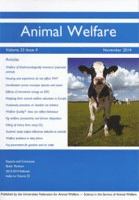
ANIMAL WELFARE
Championing animal welfare through innovative research.ANIMAL WELFARE, published by Cambridge University Press, is a vital academic journal dedicated to advancing our understanding of animal ethics, welfare science, and related practices. With an ISSN of 0962-7286 and an E-ISSN of 2054-1538, the journal offers a platform for researchers and professionals to share significant findings and insights that enhance animal protection and welfare across various settings. Operating from its distinguished location in the United Kingdom, the journal boasts a commendable impact factor and is recognized in several quartile categories in 2023, including Q3 in Animal Science and Zoology, Q3 in Biochemistry, Genetics and Molecular Biology, and Q2 in Veterinary (miscellaneous). With its diverse scope, ANIMAL WELFARE plays a crucial role in influencing policy and practice while fostering multidisciplinary discourse. It is a valuable resource for anyone dedicated to improving the lives of animals and understanding the complexities involved in animal welfare research.

Journal of Veterinary Science
Elevating Standards in Veterinary Science Research.Journal of Veterinary Science, published by the Korean Society of Veterinary Science, is a distinguished peer-reviewed Open Access journal that has been contributing to the field of veterinary medicine since its inception in 2000. With an E-ISSN of 1976-555X, this journal not only provides critical insights for researchers globally but also maintains a strong presence within the academic community, evidenced by its impressive ranking in the Scopus database, where it stands at 44 out of 194 in the general veterinary category, placing it in the 77th percentile. The journal’s impact factor reflects its rigorous standards and the significance of the research it publishes, all while offering unrestricted access to its content since 2006, which promotes the free exchange of knowledge. Situated in the vibrant academic atmosphere of Seoul, South Korea, the Journal of Veterinary Science aims to advance veterinary research and practice, covering a broad spectrum of topics to inspire students, professionals, and established researchers alike to push the boundaries of veterinary science.

EGYPTIAN JOURNAL OF VETERINARY SCIENCE
Advancing veterinary knowledge for a healthier tomorrow.Welcome to the Egyptian Journal of Veterinary Science, a pivotal publication dedicated to advancing the field of veterinary science, particularly within the unique context of Egypt and the surrounding regions. Published by the Natl Information Documentation Centre, this journal has been a key scholarly resource since its inception in 1977, focusing on diverse aspects of veterinary medicine, including animal health, nutrition, and management practices. With an impressive editorial commitment and a wide scope covering animal science, equine studies, food animals, and small animal veterinary practice, the journal stands as a critical platform for researchers and professionals alike. While currently categorized in Q4 for Animal Science and Zoology, and achieving Q3 rankings in several other veterinary subfields, it serves as a vital avenue for disseminating innovative research and practical insights. Access to the latest findings and case studies aims to foster improved veterinary practices and enhance animal welfare standards. As we navigate the complexities of veterinary science, the Egyptian Journal of Veterinary Science remains an essential tool for those committed to the health and welfare of animals across various disciplines.
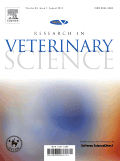
RESEARCH IN VETERINARY SCIENCE
Connecting Researchers for a Brighter Future in Veterinary ScienceRESEARCH IN VETERINARY SCIENCE, published by Elsevier Science Ltd, stands as an authoritative platform in the field of veterinary studies. With its origins dating back to 1965, this prestigious journal is recognized for its contribution to the advancement of veterinary knowledge and practices, boasting a remarkable Q1 categorization in Veterinary (miscellaneous) and ranking 24th out of 194 in the Scopus veterinary general category, placing it in the top 13% of its field. The journal presents a diverse range of research articles that explore critical topics in veterinary science, thereby facilitating evidence-based practices and innovations. Although currently not an open-access journal, it remains highly accessible through institutional and personal subscriptions, allowing researchers, professionals, and students to benefit from its rich collection of studies. As it moves toward 2024, RESEARCH IN VETERINARY SCIENCE continues to be a vital resource for those dedicated to improving animal health and advancing veterinary science.
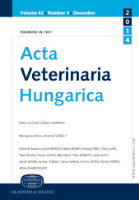
ACTA VETERINARIA HUNGARICA
Exploring the frontiers of veterinary medicine.ACTA VETERINARIA HUNGARICA is a prestigious academic journal published by AKADEMIAI KIADO ZRT, dedicated to the diverse field of veterinary science. With a history spanning over three decades since its inception in 1983, this journal provides a platform for the dissemination of high-quality research, clinical studies, and reviews that contribute to advancing knowledge in veterinary medicine and animal health. Based in Hungary, it has built a respectable reputation, reflected in its Scopus ranking, where it occupies the 84th position out of 194 in the General Veterinary category, placing it within the 56th percentile. Although the journal is not open access, it continues to attract a global audience of researchers, professionals, and students who are keen on exploring advancements in veterinary science as it converges towards its upcoming year of 2024. Readers will find valuable insights that foster innovation and improve animal care practices across various settings, making ACTA VETERINARIA HUNGARICA an essential resource for anyone involved in the veterinary field.
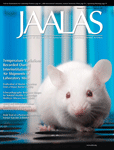
Journal of the American Association for Laboratory Animal Science
Leading the way in interdisciplinary dialogue for animal care.The Journal of the American Association for Laboratory Animal Science is a premier peer-reviewed publication dedicated to advancing the field of laboratory animal science. Published by the American Association for Laboratory Animal Science, this journal plays a crucial role in disseminating innovative research and fostering best practices in the care and use of laboratory animals. With an impressive Q1 ranking in the fields of Animal Science and Zoology and a significant Scopus ranking placing it in the 70th percentile among its peers, it stands as an influential resource for researchers, professionals, and students alike. The journal is committed to open access, ensuring that all findings are readily available to the academic community and beyond. By providing a platform for interdisciplinary dialogue and knowledge sharing, the journal contributes to the responsible and ethical advancement of laboratory animal science, which is vital for research integrity and animal welfare. With a publication timeline converging from 2006 to 2024, the Journal continues to evolve, addressing the dynamic challenges faced within the field.

Slovenian Veterinary Research
Empowering Veterinary Professionals with Research InsightsSlovenian Veterinary Research, published by the University of Ljubljana, serves as a significant platform for the dissemination of research within the veterinary field. With an ISSN of 1580-4003 and an E-ISSN of 2385-8761, this open-access journal has made its content freely available to the global research community since 2021, enhancing accessibility and engagement. The journal's scope includes a diverse range of topics relevant to veterinary science, aiming to foster innovation and collaboration among researchers, professionals, and students in the field. Although currently categorized in the Q4 quartile for veterinary studies, the journal is committed to improving its impact and visibility, particularly as it converges on its upcoming years of operation from 2007 to 2024. As it strives to elevate its Scopus ranks, currently positioned at rank #162/194 in General Veterinary, Slovenian Veterinary Research provides a vital resource for advancing knowledge and best practices in veterinary medicine. For anyone interested in the latest veterinary research trends and findings emanating from Slovenia and beyond, this journal represents an essential source of information.